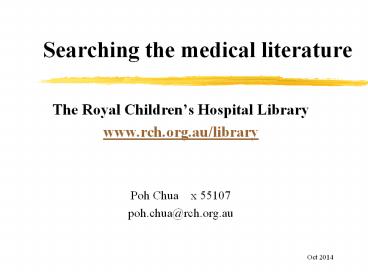Searching the medical literature - PowerPoint PPT Presentation
Title:
Searching the medical literature
Description:
Title: Systematic reviews in paediatric nephrology Author: DPHCM Last modified by: Poh Chua Created Date: 7/20/1999 12:40:06 AM Document presentation format – PowerPoint PPT presentation
Number of Views:196
Avg rating:3.0/5.0
Title: Searching the medical literature
1
Searching the medical literature
- The Royal Childrens Hospital Library
- www.rch.org.au/library
- Poh Chua x 55107
- poh.chua_at_rch.org.au
Oct 2014
2
Library membership
- Join the library to borrow items.
- Register at the library, or download the library
membership form at www.rch.org.au/library/membersh
ip.php. - NB To use most of the library resources from
home, you will need to register for Athens at
https//register.athensams.net/chc/. Once you
have completed the online form, you will see a
confirmation with your username. You will also
receive an email which you have to authenticate
to set your password. - All Athens registrations must be done on site
unless you are using _at_rch or _at_mcri email
addresses.
3
Goals
- To search for evidence-based care related
literature in a variety of databases - To become familiar with the strengths and
weaknesses of different databases - To become familiar with different search
techniques for different databases.
4
Step 1 The question
- In patients with conjunctivitis (population)
- does antibiotic treatment (intervention)
- compared with no treatment, or delayed treatment
(comparison) - reduce the severity and duration of
conjunctivitis (outcome) - A question of therapy.
5
Step 2 Using the question to identify search
terms
- Population conjunctivitis (Medical Subject
Headings , MeSH) - Intervention anti-bacterial agents (MeSH)
- Comparator placebo
- Outcome conjunctivitis (MeSH)
6
Step 3 Choosing the database
- Search the resources in the order listed
- ClinicalKey ww2.rch.org.au/library/dbases.phpebl
- OvidMD ww2.rch.org.au/library/dbases.phpebl
- BMJ Best Practice ww2.rch.org.au/library/dbases.p
hpebl - DynaMed ww2.rch.org.au/library/dbases.phpebl
- Cochrane Library ww2.rch.org.au/library/dbases.ph
pebl - SumSearch2 ww2.rch.org.au/library/dbases.phpebl
- Ovid Medline, Ovid Embase EbscoHost Medline
EbscoHost Cinahl - limiting to Clinical Queries
ww2.rch.org.au/library/dbases.phpjournalref.
Alternatively, use PubMeds Clinical Queries
(under PubMed tools on the PubMed home page).
7
ClinicalKey
- Searches the following books, journals, the
Clinics of North America series of journals,
patient education, drugs, multimedia and
guidelines. - Off-site access is via Athens.
- Use asterisk for truncation/wildcard.
- Supports the use of parentheses ( ).
8
ClinicalKey
- Register/Login to use the Presentation Maker and
to add items to the Reading List. - Content type Journals denotes available in Full
text, as opposed to content type MEDLINE, which
is not the full text but means is indexed in
Medline. Vitals is a succinct, point-of-care
content type relatively new to ClinicalKey. It is
summarised information taken from the Clinics of
North America. Vitals are still in Beta testing
phase.
9
OvidMD
- Searches the following books, journals, patient
education, drugs, guidelines and UpToDate
(subscription required to view full text). - Off-site access is via Athens.
- Use asterisk for truncation/wildcard.
- Supports the use of parentheses ( ).
10
OvidMD
11
BMJ Best Practice
- Off-site access is via Athens.
- Find the information you need by using Show
conditions, or the Search BMJ Best Practice box. - Each topic is divided into the following
sections Highlights, Basics, Prevention,
Diagnosis, Treatment, Follow Up, and Resources. - In the Treatment section, there may be an
Evidence subsection with links to Clinical
Evidence. - Use asterisk for truncation/wildcard.
- Does not support the use of parentheses ( ).
12
(No Transcript)
13
DynaMed
- Athens login is required for off-site access.
- DynaMed is a point-of-care reference resource
designed to provide clinicians with the best
available evidence to support clinical
decision-making. - DynaMed is available as a mobile application,
compatible with devices such as the Android,
BlackBerry, iPhone, iPad and iPod touch, just to
name a few. For more information, see
http//dynamed.ebscohost.com/access/mobile. - Search DynaMed using the Search box, Browse A-Z,
or Browse Categories. - Use asterisk for truncation/wildcard.
- Supports the use of parentheses ( ).
14
DynaMed
DynaMed
15
Cochrane Library
- See Library fact sheet no. 5 at
ww2.rch.org.au/library/factsheets.php. - Must search both keywords and thesaurus (MeSH).
- Remember to add search query to Search Manager
(equivalent to Search History). - Use asterisk for truncation/wildcard.
- Supports the use of parentheses ( ).
- Access is free to everyone in Australia.
16
Cochrane Library
Use Advanced Search to search The Cochrane
Library
17
Cochrane Library search history
18
SUMSearch 2
- SUMSearch2 is a free search engine.
- SUMSearch2 will search PubMed, DARE (Other
Reviews in The Cochrane Library) and the National
Guideline Clearinghouse (USA). - Use asterisk for truncation/wildcard.
- Supports the use of parentheses ( ).
- Supports both keywords and MeSH (thesaurus)
searching. - Search terms will automatically be connected by
AND. - Results are listed in categories.
19
SUMSearch2
20
Medline / PubMed and Cinahl
- Medline is available via Ovid and EbscoHost.
Athens login is required for off-site access. - PubMed is the free version of Medline and is
available from www.ncbi.nlm.nih.gov/pubmed. - Cinahl is via the EbscoHost interface. Athens
login is required for off-site access. - Applying the appropriate clinical queries in
Ovid, PubMed and EbscoHost is an effective way to
limit search results.
21
Limiting to Clinical Queries in Ovid
Use Additional Limits icon to access Clinical
Queries options
22
Limiting to Clinical Queries in Ovid
23
Limiting to Clinical Queries in PubMed
Select Clinical Queries in PubMed Tools
Enter search terms into the search box
Select the required Category and Scope
24
Limiting to Clinical Queries in EbscoHost
Use Edit to access Clinical Queries options
25
Limiting to Clinical Queries in EbscoHost
26
Step 4 Evaluate search results from various
databases
- Relevant trials?































